世纪商务英语Unit 9
- 格式:doc
- 大小:51.50 KB
- 文档页数:6
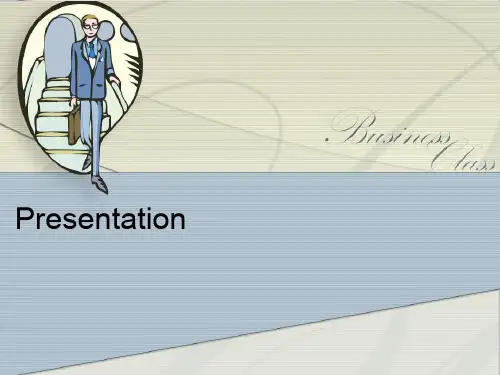
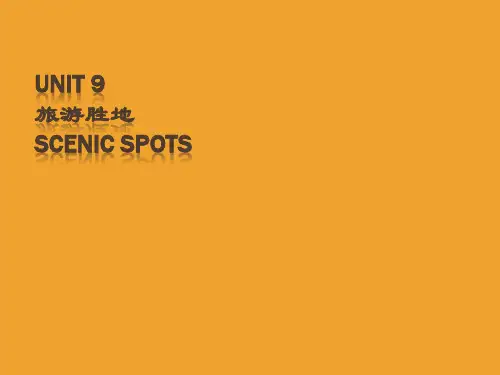
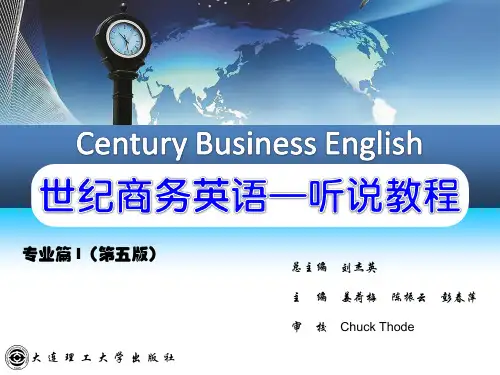


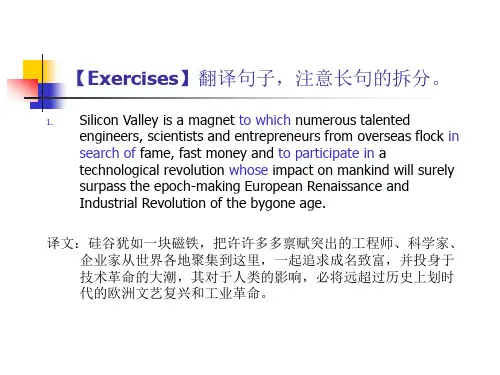
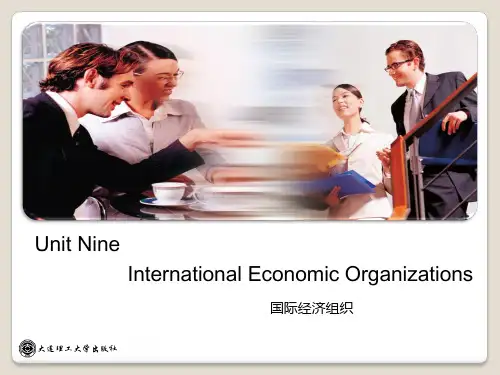
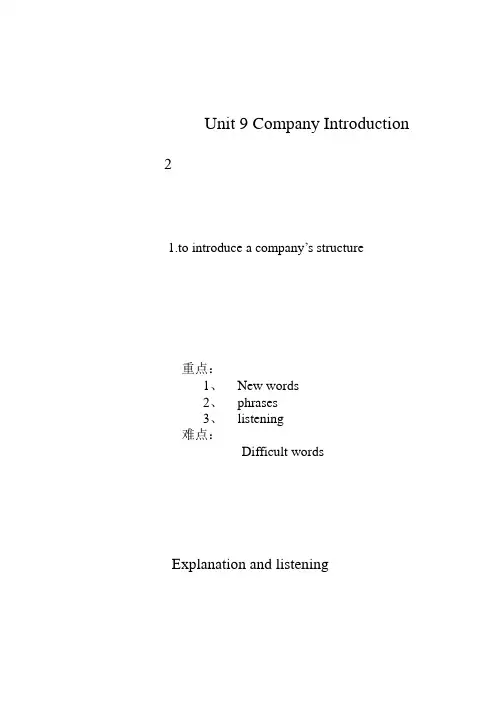
Unit 9 Company Introduction 21.to introduce a company’s structure重点:1、New words2、phrases3、listening难点:Difficult words Explanation and listeningUnit 9 Company Introduction1. Warm-up2. to introduce a company’s structureRecite new words第一课时Step1 new words1.On behalf of 为了…的利益He spoke on behalf of the plan.他为这项计划辩护。
At the airport he read an address of welcome on behalf of the association. 在机场上他代表该协会致了欢迎词。
I'm writing on behalf of my mother to express her thanks for your gift.我代表我母亲写信, 对你的礼物表示感谢。
2. in charge of 负责The teacher is in charge of the class.这位教师负责这个班。
I'll be in charge of the whole factory next week when the director is away. 下周厂长不在时, 我将负责整个工厂。
The cook is in charge of the kitchen helper.这位厨师负责管理厨工。
Pilfering has stopped entirely since they put Angus in charge of the stores. 自从他们让安格斯掌管商店以来, 小偷小摸就杜绝了。
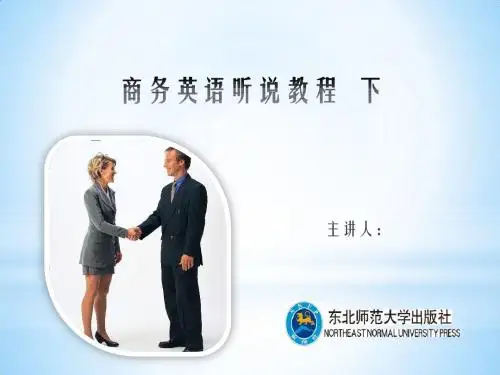
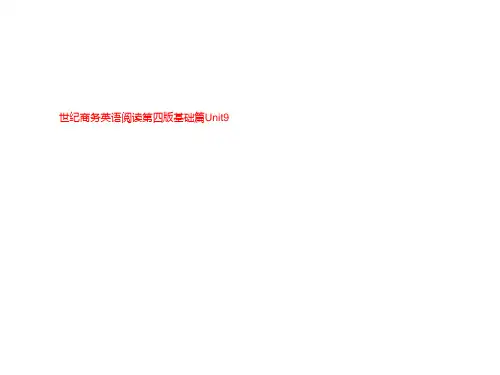
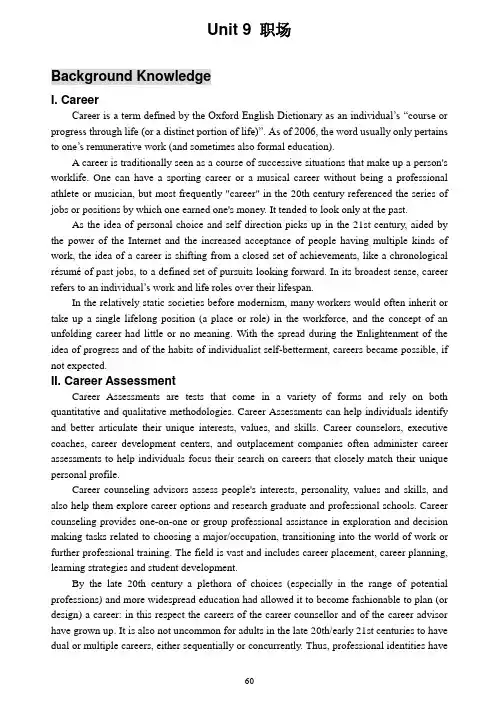
Unit 9 职场Background KnowledgeI. CareerCareer is a term defined by the Oxford English Dictionary as an individual’s ―course or progress through life (or a distinct portion of life)‖. As of 2006, the word usually only pertains to one’s remunerative work (and sometimes also formal education).A career is traditionally seen as a course of successive situations that make up a person's worklife. One can have a sporting career or a musical career without being a professional athlete or musician, but most frequently "career" in the 20th century referenced the series of jobs or positions by which one earned one's money. It tended to look only at the past.As the idea of personal choice and self direction picks up in the 21st century, aided by the power of the Internet and the increased acceptance of people having multiple kinds of work, the idea of a career is shifting from a closed set of achievements, like a chronological résumé of past jobs, to a defined set of pursuits looking forward. In its broadest sense, career refers to an individual’s work and life roles over their lifespan.In the relatively static societies before modernism, many workers would often inherit or take up a single lifelong position (a place or role) in the workforce, and the concept of an unfolding career had little or no meaning. With the spread during the Enlightenment of the idea of progress and of the habits of individualist self-betterment, careers became possible, if not expected.II. Career AssessmentCareer Assessments are tests that come in a variety of forms and rely on both quantitative and qualitative methodologies. Career Assessments can help individuals identify and better articulate their unique interests, values, and skills. Career counselors, executive coaches, career development centers, and outplacement companies often administer career assessments to help individuals focus their search on careers that closely match their unique personal profile.Career counseling advisors assess people's interests, personality, values and skills, and also help them explore career options and research graduate and professional schools. Career counseling provides one-on-one or group professional assistance in exploration and decision making tasks related to choosing a major/occupation, transitioning into the world of work or further professional training. The field is vast and includes career placement, career planning, learning strategies and student development.By the late 20th century a plethora of choices (especially in the range of potential professions) and more widespread education had allowed it to become fashionable to plan (or design) a career: in this respect the careers of the career counsellor and of the career advisor have grown up. It is also not uncommon for adults in the late 20th/early 21st centuries to have dual or multiple careers, either sequentially or concurrently. Thus, professional identities havebecome hyphenated or hybridized to reflect this shift in work ethic. Economist Richard Florida notes this trend generally an d more specifically among the ―creative class.‖III. When Job-Hunting: Dress for SuccessIt’s probably one of the most overused phrases in job-hunting, but also one of the most underutilized by job-seekers: dress for success. In job-hunting, first impressions are critical. Remember, you are marketing a product—yourself—to a potential employer, and the first thing the employer sees when greeting you is your attire; thus, you must make every effort to have the proper dress for the type of job you are seeking. Will dressing properly get you the job? Of course not, but it will give you a competitive edge and a positive first impression.Should you be judged by what you wear? Perhaps not, but the reality is, of course, that you are judged. Throughout the entire job-seeking process employers use short-cuts—heuristics or rules of thumb—to save time. With cover letters, it's the opening paragraph and a quick scan of your qualifications. With resumes, it is a quick scan of your accomplishments. With the job interview, it's how you're dressed that sets the tone of the interview.How should you dress? Dressing conservatively is always the safest route, but you should also try and do a little investigating of your prospective employer so that what you wear to the interview makes you look as though you fit in with the organization. If you overdress (which is rare but can happen) or underdress (the more likely scenario), the potential employer may feel that you don't care enough about the job.How do you find out what is the proper dress for a given job/company/industry? You can call the Human Resources office where you are interviewing and simply ask. Or, you could visit the company's office to retrieve an application or other company information and observe the attire current employees are wearing—though make sure you are not there on a ―casual day‖ and misinterpret the dress code.Finally, do you need to run out and spend a lot of money on clothes for interviewing? No, but you should make sure you have at least two professional sets of attire. You'll need more than that, but depending on your current financial condition, two is enough to get started and you can buy more once you have the job or have more financial resources.Hints for Dress for Success for Men and WomenAttention to details is crucial, so here are some tips for both men and women. Make sure you have:⊙clean and polished conservative dress shoes⊙well-groomed hairstyle⊙cleaned and trimmed fingernails⊙minimal cologne or perfume⊙no visible body piercing beyond conservative ear piercings for women⊙well-brushed teeth and fresh breath⊙no gum, candy, or other objects in your mouth⊙minimal jewelry⊙no body odorFinally, check your attire in the rest room just before your interview for a final check of your appearance—to make sure your tie is straight, your hair is combed, etc..Reading Skill FocusPractice 21. autocratic parent–his word is the law; he assumes he knows what is best for his children and the children will learn discipline and respect for authority;2. democratic parent –he is willing to discuss and listen; his role is advisor3. permissive parent–he has no rules and offers no guidance to his childrenReading MosaicComprehensive Reading同事转变成竞争对手1 你得承认当你的同事从上级那里获得称赞,你会有点嫉妒。
TranslationUnit1:Language for Business1.九寨沟以其自然美景吸引了众多旅游者。
(natural beauty)Eg: Jiuzhaigou has capitalized on(利用)its natural beauty to attract lots of tourists.2.你应该利用你的经验,获得报酬更高的工作。
(higher payment)Eg: You should capitalize on your experience to get the job with higher payment.3.这家公司利用优越的地理位置拓展了海外市场。
(geographic position)Eg:This firm expanded the Overseas market(拓展海外市场)by capitalizing on their advantageous geographic position.4.我们要申请商标注册。
(apply for申请)Eg:We’d like to apply for the registration of our trademarks.5.如果你英语口语好,你应在这家美国公司找一份工作。
(have a good command of掌握)Eg:If you have a good command of oral English, you should find a job in this American company.6.在明天的求职面试中你应与面试者保持眼神交流以表示你的自信。
(job interview)Eg:You need to maintain eye contact(保持眼神交流)with the interviewer to show your confidence(展现你的自信)in the job interview tomorrow.7.我们将利用我们的优势卖给出价最高、最好的人。
商务英语视听说答案unit91、Julia’s on holiday in Shanghai _______. [单选题] *A. in a momentB. after a momentC. at the moment(正确答案)D. at any moment2、( ) My mother told me _____ in bed. [单选题] *A. not readB. not readingC. don’t readD. not to read(正确答案)3、His remarks _____me that I had made the right decision. [单选题] *A.ensuredB.insuredC.assured(正确答案)D.assumed4、Which is _______ city, Shanghai, Beijing or Chengdu? [单选题] *A. largeB. largerC. largestD. the largest(正确答案)5、Tom and Mary's house bought last year is()Lucy, s. [单选题] *A. the three size ofB. three times the size of(正确答案)C. as three times large asD. three times as larger as6、59.—Can I talk to the manager?—Please wait ________ minute. [单选题] * A.anB.a(正确答案)C.theD./7、He is a student of _______. [单选题] *A. Class SecondB. the Class TwoC. Class Two(正确答案)D. Second Two8、It is important for us _______ English well. [单选题] *A. learnB. learningC. to learn(正确答案)D. learned9、I have to _______ my glasses, without which I can’t read the book. [单选题] *A. put upB. put awayC. put downD. put on(正确答案)10、You have failed two tests. You’d better start working harder, ____ you won’t pass the course. [单选题] *A. andB. soC. butD. or(正确答案)11、Is there going to ______ a football match in the stadium next month?()[单选题] *A. beingB. haveC. be(正确答案)D. having12、Mr. Wang is coming to our school. I can’t wait to see _______. [单选题] *A. herB. him(正确答案)C. itD. them13、72.I really don’t know how to thank you , but for your help, I ()my lost necklace.[单选题] *A.couldn’t have found(正确答案)B.mustn’t have foundC.couldn’t findD.wouldn’t find14、I don’t know how to improve my English. Can I ask you for some _______? [单选题] *A. answersB. advice(正确答案)C. questionsD. words15、He used to get up at six in the morning,()? [单选题] *A. used heB. did heC. didnt he (正确答案)D. should he16、11.________ big furniture shop it is! [单选题] *A.HowB.WhatC.What a (正确答案)D.What an17、I have worked all day. I'm so tired that I need _____ . [单选题] *A. a night restB. rest of nightC. a night's rest(正确答案)D. a rest of night18、The black coal there shows a sharp()white snow. [单选题] *A. contract withB. content withC. contact toD. contrast to(正确答案)19、The hall in our school is _____ to hold 500 people. [单选题] *A. big enough(正确答案)B. enough bigC. very smallD. very big20、_____ the plan carefully,he rejected it. [单选题] *A. To have consideredB.To considerC. Having considered(正确答案)D. Considering21、If it _______ tomorrow, I won’t go there. [单选题] *A. rains(正确答案)B. is rainingC. will rainD. would rain22、_____ is not known yet. [单选题] *A. Although he is serious about itB. No matter how we will do the taskC. Whether we will go outing or not(正确答案)D. Unless they come to see us23、The manager isn’t in at the moment. May I _______ a message? [单选题] *A. take(正确答案)B. makeC. haveD. keep24、Some people were born with a good sense of direction. [单选题] *A. 听觉B. 方向感(正确答案)C. 辨别力D. 抽象思维25、( ) You had your birthday party the other day,_________ [单选题] *A. hadn't you?B. had you?C. did you?D. didn't you?(正确答案)26、There are trees on both sides of the broad street. [单选题] *A. 干净的B. 狭窄的C. 宽阔的(正确答案)D. 宁静的27、We _______ swim every day in summer when we were young. [单选题] *A. use toB. are used toC. were used toD. used to(正确答案)28、The boy’s mother always _______ him a story before he goes to bed. [单选题] *A. saysB. speaksC. tells(正确答案)D. talks29、I shall never forget the days()we worked on the farm. [单选题] *A. when(正确答案)B. whatC. whichD. on that30、10.﹣Could you please sweep the floor?I’m going to cook dinner.﹣__________.I’ll do it at once,Mom.[单选题] *A.I’m afraid notB.You’re kiddingC.It’s a shameD.My pleasure(正确答案)。
Unit 9 职场Background KnowledgeI. CareerCareer is a term defined by the Oxford English Dictionary as an individual’s ―course or progress through life (or a distinct portion of life)‖. As of 2006, the word usually only pertains to one’s remunerative work (and sometimes also formal education).A career is traditionally seen as a course of successive situations that make up a person's worklife. One can have a sporting career or a musical career without being a professional athlete or musician, but most frequently "career" in the 20th century referenced the series of jobs or positions by which one earned one's money. It tended to look only at the past.As the idea of personal choice and self direction picks up in the 21st century, aided by the power of the Internet and the increased acceptance of people having multiple kinds of work, the idea of a career is shifting from a closed set of achievements, like a chronological résumé of past jobs, to a defined set of pursuits looking forward. In its broadest sense, career refers to an individual’s work and life roles over their lifespan.In the relatively static societies before modernism, many workers would often inherit or take up a single lifelong position (a place or role) in the workforce, and the concept of an unfolding career had little or no meaning. With the spread during the Enlightenment of the idea of progress and of the habits of individualist self-betterment, careers became possible, if not expected.II. Career AssessmentCareer Assessments are tests that come in a variety of forms and rely on both quantitative and qualitative methodologies. Career Assessments can help individuals identify and better articulate their unique interests, values, and skills. Career counselors, executive coaches, career development centers, and outplacement companies often administer career assessments to help individuals focus their search on careers that closely match their unique personal profile.Career counseling advisors assess people's interests, personality, values and skills, and also help them explore career options and research graduate and professional schools. Career counseling provides one-on-one or group professional assistance in exploration and decision making tasks related to choosing a major/occupation, transitioning into the world of work or further professional training. The field is vast and includes career placement, career planning, learning strategies and student development.By the late 20th century a plethora of choices (especially in the range of potential professions) and more widespread education had allowed it to become fashionable to plan (or design) a career: in this respect the careers of the career counsellor and of the career advisor have grown up. It is also not uncommon for adults in the late 20th/early 21st centuries to have dual or multiple careers, either sequentially or concurrently. Thus, professional identities havebecome hyphenated or hybridized to reflect this shift in work ethic. Economist Richard Florida notes this trend generally an d more specifically among the ―creative class.‖III. When Job-Hunting: Dress for SuccessIt’s probably one of the most overused phrases in job-hunting, but also one of the most underutilized by job-seekers: dress for success. In job-hunting, first impressions are critical. Remember, you are marketing a product—yourself—to a potential employer, and the first thing the employer sees when greeting you is your attire; thus, you must make every effort to have the proper dress for the type of job you are seeking. Will dressing properly get you the job? Of course not, but it will give you a competitive edge and a positive first impression.Should you be judged by what you wear? Perhaps not, but the reality is, of course, that you are judged. Throughout the entire job-seeking process employers use short-cuts—heuristics or rules of thumb—to save time. With cover letters, it's the opening paragraph and a quick scan of your qualifications. With resumes, it is a quick scan of your accomplishments. With the job interview, it's how you're dressed that sets the tone of the interview.How should you dress? Dressing conservatively is always the safest route, but you should also try and do a little investigating of your prospective employer so that what you wear to the interview makes you look as though you fit in with the organization. If you overdress (which is rare but can happen) or underdress (the more likely scenario), the potential employer may feel that you don't care enough about the job.How do you find out what is the proper dress for a given job/company/industry? You can call the Human Resources office where you are interviewing and simply ask. Or, you could visit the company's office to retrieve an application or other company information and observe the attire current employees are wearing—though make sure you are not there on a ―casual day‖ and misinterpret the dress code.Finally, do you need to run out and spend a lot of money on clothes for interviewing? No, but you should make sure you have at least two professional sets of attire. You'll need more than that, but depending on your current financial condition, two is enough to get started and you can buy more once you have the job or have more financial resources.Hints for Dress for Success for Men and WomenAttention to details is crucial, so here are some tips for both men and women. Make sure you have:⊙clean and polished conservative dress shoes⊙well-groomed hairstyle⊙cleaned and trimmed fingernails⊙minimal cologne or perfume⊙no visible body piercing beyond conservative ear piercings for women⊙well-brushed teeth and fresh breath⊙no gum, candy, or other objects in your mouth⊙minimal jewelry⊙no body odorFinally, check your attire in the rest room just before your interview for a final check of your appearance—to make sure your tie is straight, your hair is combed, etc..Reading Skill FocusPractice 21. autocratic parent–his word is the law; he assumes he knows what is best for his children and the children will learn discipline and respect for authority;2. democratic parent –he is willing to discuss and listen; his role is advisor3. permissive parent–he has no rules and offers no guidance to his childrenReading MosaicComprehensive Reading同事转变成竞争对手1 你得承认当你的同事从上级那里获得称赞,你会有点嫉妒。